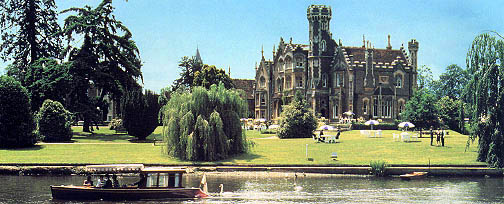
The History of
Oakley Court

Oakley Court is situated
along a stretch of the Thames known as Water Oakley. It was first
shown on maps around 1800 and the name appears to originate from
Cornish Breton in which it appears as "Warhta Eog Lee"
- The Upper Salmon Place.
The Court was originally
built in 1859 for Sir Richard Hall-Say and legend has it that
he built it in the style of a French Chateau to comfort his homesick
young French wife. Leslie Ward (the artist 'SPY' of Vanity Fair)
recounts in his autobiography 'Forty Years of SPY, p. 30) that
from Eton, I frequently
had leave to visit some friends of my parents, the Evans, of
Boveney Court, a delightful old coutry house opposite Surly Hall.
Miss Evans married a Mr. Hall-Say who built Oakley Court, and
I was present when he laid the foundation stone. Leslie Ward would have been around
nine years old at the time. His recollection suggests that the
story that Sir Richard built Oakley Court for his home-sick French
wife may be ill-founded.
Oakley Court was sold to
Lord Otho Fitzgerald according to some records in 1880 but Leslie
Ward recalls attending a dance there in 1875 given by Lord and
Lady Otho where he was to meet The Prince Imperial of France.
In 1870 The Prince Imperial had to
flee from France with the Imperial Family and they settled in
Chislehurst, Kent. During the 1870s there was some talk of a
marriage between him and Queen Victoria's youngest daughter,
Princess Beatrice. It can be seen therefore that at one point
Oakley Court was a meeting place for the highest of high-society!
Oakley Court was subsequently
sold to a John Lewis Phipps and in 1908 to Sir William Avery
of Avery Scales. In 1919, Mr Ernest Olivier purchased the property
together with 60 acres of Berkshire woodland for the sum of £27,000.
He was a very eccentric character who frequently entertained
foreign diplomats and as a courteous gesture flew the flag of
the nation they represented on the original flagpole which still
stands today. It is believed that the Court was used during the
last war as the English Headquarters for the French Resistance
and President De Gaulle is reputed to have stayed in one of the
Mansion bedrooms
In 1955, Bray Studios moved
to Down Place, just next door to Oakley Court. After Mr Olivier's
death in 1965 the Court lay uninhabited. For the next 14 years
it became an ideal setting for many of the films made by Southern
Pictures. During this period, some 200 films were made in and
around the property, most notable. were the St. Trinians series.
The Rocky Horror Show, Half a Sixpence starring Tommy Steele,
Murder by Death starring Peter Sellers and perhaps most famous
of all were the Hammer Horror productions, notably Dracula. When
the Dracula films were made at Oakley Court directors obtained
an eerie effect by using candles to light the entire Court.
In 1979 conversion into
a hotel began. Wherever possible, the furniture and plaster were
restored and this is particularly noticeable in the Drawing Room
and Library. Two extensions were built onto the Mansion, the
Riverside and Garden Wings. Today these house 85 hotel bedrooms,
although there are 8 suites in the Mansion itself.
On 7th November 1981, after
2 years of renovation and the sum of £5 million spent on
the property, Oakley Court opened its doors as a hotel. In June
1997, a third wing was added known as "The Courtyard Wing"
with an additional 21 air conditioned bedrooms and finally, a
Health and Fitness Club consisting of a Swimming Pool, Spa Pool,
Sauna, Steam Room, Solarium, Gym, Beauty Treatment Room plus
2 Tennis Courts. Now, with its former splendour and beautiful
setting of 30 acres of landscaped gardens on the banks of the
Thames, Oakley Court ranks as of one of the outstanding hotels
of this country.
The Royal Windsor
Web Site by

To contact us, email Thamesweb.
|

